《研究生英语精读教程》(第三版·上)
- 格式:ppt
- 大小:671.50 KB
- 文档页数:178
![研究生英语精读教程[上册]Unit 12](https://uimg.taocdn.com/e9323ae2f8c75fbfc77db23e.webp)

![研究生英语精读教程[上册]Unit 2](https://uimg.taocdn.com/fa8e0feb9b89680203d82526.webp)
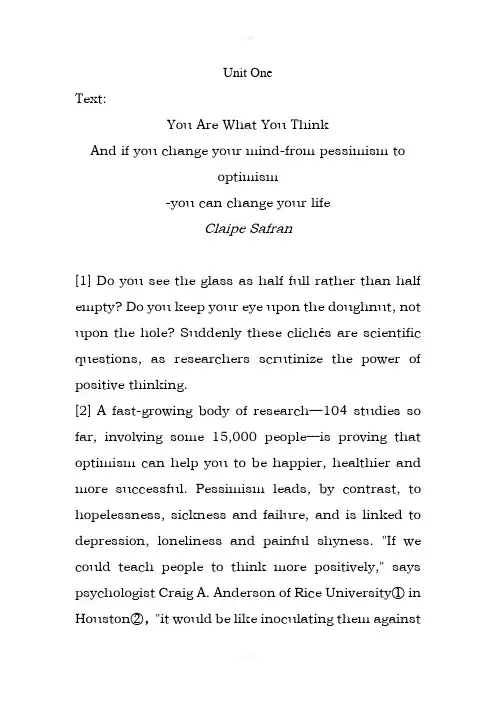
Unit OneText:You Are What You ThinkAnd if you change your mind-from pessimism tooptimism-you can change your lifeClaipe Safran[1] Do you see the glass as half full rather than half empty? Do you keep your eye upon the doughnut, not upon the hole? S uddenly these clichés are scientific questions, as researchers scrutinize the power of positive thinking.[2] A fast-growing body of research—104 studies so far, involving some 15,000 people—is proving that optimism can help you to be happier, healthier and more successful. Pessimism leads, by contrast, to hopelessness, sickness and failure, and is linked to depression, loneliness and painful shyness. "If we could teach people to think more positively," says psychologist Craig A. Anderson of Rice Universit y① in Houston②,"it would be like inoculating them againstthese mental ills."[3] "Your abilities count," explains psychologist Michael F. Scheier of Carnegie Mellon University③ in Pittsburgh④, "but the belief that you can succeed affects whether or not you will." In part , that's because optimists and pessimists deal with the same challenges and disappointments in very different ways.[4] Take, for example, your job. In a major study, psychologist Martin E. P. Seligman of the University of Pennsylvania⑤and colleague Peter Schulman surveyed sales representatives at the Metropolitan Life Insurance Co. They found that the positive-thinkers among longtime representatives sold 37-percent more insurance than did the negative-thinkers. Of newly hired representatives, optimists sold 20-percent more.[5] Impressed, the company hired 100 people who had failed the standard industry test⑥ but had scored high on optimism. These people, who might never have been hired, sold 10 percent more insurance than did the average representative.[ 6 ] How did they do it? The secret to an optimist's success, according to Seligman, is in his "explanatory style". When things go wrong the pessimist tends to blame himself. "I'm no good at this, " he says, "I always fail." The optimist looks for loopholes. He blames the weather, the phone connection, even the other person. That customer was in a bad mood, he thinks. When things go right, the optimist takes credit while the pessimist sees success as a fluke. [ 7 ] Craig Anderson had a group of students phone strangers and ask them to donate blood to the Red Cross⑦. When they failed on the first call or two, pessimists said, "I can't do this." Optimists told themselves, "I need to try a different approach."[ 8 ] Negative or positive, it was a self-fulfilling prophecy. "If people feel hopeless, "says Anderson, "they don't bother to acquire the skills they need to succeed."[9] A sense of control, according to Anderson, is the litmus test⑧ for success. The optimist feels in control of his own life. If things are going badly, he acts quickly, looking for solutions, forming a new plan ofaction, and reaching out for advice. The pessimist feels like fate's plaything and moves slowly. He doesn't seek advice, since he assumes nothing can be done.[ 10 ] Optimists may think they are better than the facts would justify—and sometimes that's what keeps them alive. Dr. Sandra Levy of the Pittsburgh Cancer Institute studied women with advanced breast cancer. For the women who were generally optimistic, there was a longer disease-free interval, the best predictor of survival. In a pilot study of women in the early stages of breast cancer, Dr. Levy found the disease recurred sooner among the pessimists.[ 11 ] Optimism won't cure the incurable, but it may prevent illness. In a long term study, researchers examined the health histories of a group of Harvard graduates, all of whom were in the top half of their class and in fine physical condition. Yet some were positive thinkers, and some negative. Twenty years later, there were more middle-age diseases—hypertension, diabetes, heart ailments —among the pessimists than the optimists.[ 12 ] Many studies suggest that the pessimist's feeling of helplessness undermines the body's natural defenses, the immune system. Dr. Christopher Peterson of the University of Michigan⑨has found that the pessimist doesn't take good care of himself. Feeling passive and unable to dodge life's blows, he expects ill health and other misfortunes, no matter what he does. He munches on junk food⑩,avoids exercise, ignores the doctor, has another drink.[ 13 ] Most people are a mix of optimism and pessimism, but are inclined in one direction or the other. It is a pattern of thinking learned “at your mother‘s knee”,says Seligman. It grows out of thousands of cautions or encouragements, negative statements or positive ones. Too many “don’ts” and warnings of danger can make a child feel incompetent, fearful—and pessimistic.[ 14 ] As they grow, children experience small triumphs, such as learning to tie shoelaces. Parents can help turn these successes into a sense of control, and that breeds optimism.[ 15 ] Pessimism is a hard habit to break—but it canbe done. In a series of landmark studies, Dr. Carol Dweck11of the University of Illinois12has been working with children in the early grades of school. As she helps floundering students to change the explanations for their failures—from "I must be dumb" to "I didn't study hard enough“—their academic performance improves.[ 16 ] Pittsburgh's Dr. Levy wondered if turning patients into optimists would lengthen their lives. In a pilot study, two groups of colon-cancer patients were given the same medical treatment, but some were also given psychological help to encourage optimism. Results showed that this worked. Now a major study is planned to determine whether this psychological change can alter the course of the disease.[ 17 ] So, if you're a pessimist, there's reason for optimism. You can change. Here's how, says Steve Hollon, a psychologist at Vanderbilt University13: [ 18 ] 1. Pay careful attention to your thoughts when bad things happen. Write down the first thing that comes to mind, unedited and uncensored[ 19 ] 2. Now try an experiment. Do something that'scontrary to any negative reactions. Let's say something has gone wrong at work. Do you think, I hate my job, but I could never get a better one? Act as if that weren't so. Send out resumés. Go to interviews. Look into training and check job leads[ 20 ] 3. Keep track of what happens. Were your first thoughts right or wrong? "If your thoughts are holding you back, change them," says Hollon. "It's trial and error, no guarantees, but give yourself a chance."[ 21 ] Positive thinking leads to positive action, and reaction. What you expect from the world, the evidence suggests, is what you're likely to get..。
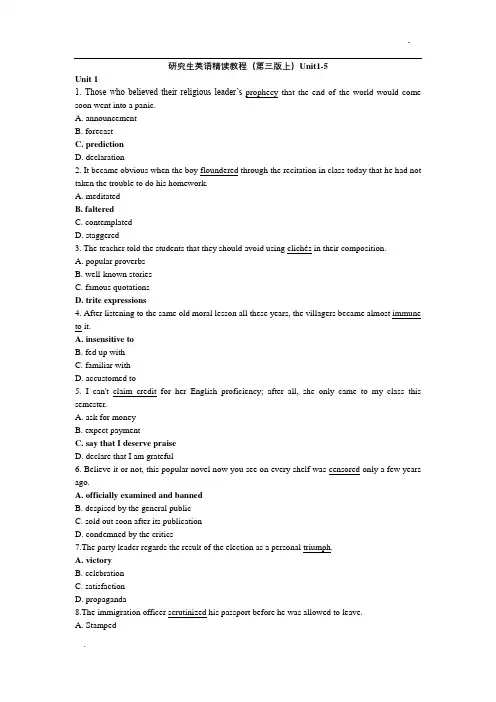
研究生英语精读教程(第三版上)Unit1-5Unit 11. Those who believed their religious leader’s prophecy that the end of the world would come soon went into a panic.A. announcementB. forecastC. predictionD. declaration2. It became obvious when the boy floundered through the recitation in class today that he had not taken the trouble to do his homework.A. meditatedB. falteredC. contemplatedD. staggered3. The teacher told the students that they should avoid using clichés in their composition.A. popular proverbsB. well-known storiesC. famous quotationsD. trite expressions4. After listening to the same old moral lesson all these years, the villagers became almost immune to it.A. insensitive toB. fed up withC. familiar withD. accustomed to5. I can't claim credit for her English proficiency; after all, she only came to my class this semester.A. ask for moneyB. expect paymentC. say that I deserve praiseD. declare that I am grateful6. Believe it or not, this popular novel now you see on every shelf was censored only a few years ago.A. officially examined and bannedB. despised by the general publicC. sold out soon after its publicationD. condemned by the critics7.The party leader regards the result of the election as a personal triumph.A. victoryB. celebrationC. satisfactionD. propaganda8.The immigration officer scrutinized his passport before he was allowed to leave.A. StampedB. examinedC. returnedD. issued9.He suffered a long period of depression before his first suicide attempt.A. InoculationB. hypertensionC. ailmentsD. dejection10. He was never able to enjoy the metropolitan delights of cinemas and theatres.A. artisticB. modernC. urbanD. various11.He quickly _____ behind the building to avoid being hurt by the stones thrown in his direction.A. eludedB. evadedC. escapedD. dodged12.His dislike of the course may prove to be a _____ barrier he cannot overcome.A. BiologicalB. ideologicalC. spiritualD. psychological13.As the Cup Final was drawing closer, the injury of the best player was a _____ for the whole team.A. misdemeanourB. mistrustC. misfortuneD. mischief14. The best solution to the problem can only be found by a process of trial and _____.A. errorB. mistakeC. successD. experiment15. He thought that he might be able to avoid paying some of his taxes by taking advantage of the ______ in the law.A. circlesB. loopholesC. exceptionsD. misunderstanding16. When he lived in that remote place, radio was the only means he had to keep _____ of current events in the country.A. accountB. traceD. track17. ______ what is generally believed, the adjustment to this kind of work is quite easy.A. Contrary toB. Contrast withC. Controversial ofD. Contradictory to18. The flashing red light served as a ______ of danger ahead.A. predictorB. cautionC. precautionD. prevention19. Their confidence in him was greatly ______ by his prolonged hesitation before taking any action.A. appreciatedB. confirmedC. underminedD. cherished20. Your headache is likely to ______ if its real cause is not identified and proper treatment administered accordingly.A. cureB. recoverC. recurD. releaseUnit 21. After his father died, Bill took onthe management of the factory.A. gotB. undertookC. organizedD. held2. Those students who have access to his esoteric discussions were impressed by the scope of his thinking.A. known by fewB. known to allC. very livelyD. quite popular3. The music of the radio distracted me from my reading.A. engrossedB. confusedC. refrainD. diverted4. Abraham Lincoln was quintessential American patriot.B. famousC. typicalD. revered5. Every now and then, the speaker interjected some witty remark.A. rejectedB. criticizedC. insertedD. jeered6. Why do you get angry over such trivial matters?A. of great worthB. of great benefitC. of little worthD. of little help7. The youngest boy was laughed at for his naive remarks.A. innocentB. wittyC. amusingD. foolish8. The lady rumpled her skirt by sitting on the seat while flying.A. disorderedB. disarrangedC. creasedD. crashed9. Thousands of people are needlessly slaughtered in road accidents in his country each year.A. woundedB. killedC. injuredD. crushed10. I bought this cloth cheap because there is a small defect in it.A. spotB. dotC. flawD. point11. Your job is not to make decisions but to _____ the decisions we make.A. completeB. accomplishC. implementD. affect12. Would you _____ him among the world’s great statesmen?A. rankB. callC. nameD. hail13. Understanding is one of the most important _____ of a successful marriage.A. ingredientsB. standardsC. keysD. methods14. There are _____ of poison in the dead man’s blood.A. piecesB. tracesC. slicesD. lots15. He had been ill for months, and we were disturbed by his _____ complexion.A. fairB. sallowC. darkD. white16. A witness in court is _____ to tell the truth.A. temptedB. obligatedC. urgedD. praised17. A _____ swelling or tumour can usually be cured.A. malignantB. benignC. smallD. mild18. It is better to _____ on the side of mercy.A. errB. addC. workD. offer19. He has a very _____ address; he lives in the best part of town.A. wealthyB. comfortableC. prestigiousD. Accessible20. We all listened to the priest _____ the psalm.A. intoningB. utteringC. speakingD. deliveringUnit 31. High rate of unemployment and violence are deplored by many people.A. condemnedB. convincedC. declaredD. perpetuated2. They are planning to embark on a new business undertaking.A. go forB. go withC. go intoD. go on3. In the Middle Ages, many people in Europe suffered persecution for their religious beliefs.A. treatmentB. punishmentC. disillusionD. execution4. We couldn’t induce the old lady to travel by air.A. driveB. convinceC. forceD. suggest5. He went into a coma because of serious loss of blood.A. bad coughB. whitenessC. tremblingD. state of profound insensibility6. The ethics of his decision are doubtful.A. raceB. aestheticsC. moralsD. cause7. The patients tax the doctor's patience by asking him so many silly questions.A. pestB. are a strain onC. injureD. destroy8. They broke up the alliance.A. brought to an endB. dispersedC. stopped to enter intoD. changed for the worse9. The boys were summoned in turn to see the examiner.A. separatelyB. occasionallyC. allD. in succession10.They traveled all over the country, regardless of expense.A. unkind toB. paying no attention toC. forgettingD. concerned with11.The story was so funny that we were all in __________.A. excitementB. convulsionsC. emotionD. fixation12.Gluttony is just as much a __________ as drunkenness.A. viceB. vicinityC. viciousnessD. vicissitude13.Each room is decorated with a lamp ________ from the ceiling.A. droppedB. pulledC. suspendedD. fallen14.My first meeting with her often __________ to my memory.A. fellsB. recallsC. refreshesD. recurs15.He writes like a(n) __________: there are mistakes in every sentence.A. pupilB. illiterateC. teenagerD. school boy16.The goal is not yet ____________.A. to gainB. to sustainC. to restrainD. to attain17.It was reported that during the bombing, many people were killed or wounded by _____________.A. flowB. blastC. currentD. stream18.She learnt to swim at once - she seemed totally without _________ of the water.A. panicB. fearD. terribleness19. We raised a we must pay off it this year ______.A. creditB. good sumC. loanD. mortgage20. Some children complain that their parents ______at them all day.A. blameB. scoldC. nagD. cryUnit 41. She was in anguish until she knew that her husband's life was saved.B. great regretC. great despairD. great disappointment2. I have nothing but disdain for such a person.A. respectB. hatredC. dislike3. The grass was interspersed with beds of flowers.A. scatteredB. spreadC. diversified4. I am sure disease must propagate in such unsanitary and crowded areas.A. releaseC. promoteD. generate5. There was a meager attendance at the council meeting.B. enoughC. ampleD. haughty6. The end of 1921 found the capitalist offensive against the workers in full swing.A. negotiationB. punishment7. We can't rule out the possibility that he will come after all.B. refuseC. acceptD. take8. John was confined to bed for a week with his cold.A. allowed inC. tied toD. shut on9. We three were the sole survivors in the traffic accident.A. luckyB. fortunateC. blessed10. I slept through her dull speech.A. dozingC. fascinatingD. imaginative11. I have been in _________ with him about the matter.A. lettersB. dealingsC. writings12. I could hear only __________ of their conversation.A. piecesB. slipsD. portions13. The old lady ______ the sweet-smelling flowers into a garland.A. tiedC. curvedD. twisted14. A ______ man will stop at nothing to get what he wants.B. prudentC. shrewdD. rude15. Most bacteria grow best in a slightly acid ______.A. areaB. placeC. district16. Everyone knows that the firefly is a _____ insect.A. firingB. lightingD. glowing17. Sports, and not learning, seem to ______ in that school. A. appearB. occupyD. lead18. Each chess player will have five minutes to ______ his next move. A. makeB. haveC. take19. This time they really ______ better results.A. hopedC. wishedD. wished to20. ______ came of his success abroad.B. A wordC. WordsD. The wordUnit 51. His beautiful writing is akin to drawing.A. asB. fromC. above2. His knowledge on the subject seems to be on a par with my own. A. different fromC. related toD. in accordance with3. Tom and Mary were married a week after they met and soon found themselves at odds about religion.B. on strikeC. in questionD. on purpose4. The inventor was vilified in yesterday's newspaper.A. abusedC. praisedD. criticized5. The Mississippi flood of 1973 was a major catastrophe in which a great many lives were lost.A. casualtyC. changeD. threat6. She almost yielded to an unexpected impulse to dance in the street.A. urgent desireC. good ideaD. fancy thought7. Mr. Green posed as a rich man though he owed more than he owned.A. workedB. lookedC. clothed8. They feared the plague and regarded it as a deadly scourge.B. IllnessC. troubleD. ailment9. Some people have a bias against foreigners.B. dislikeC. hatredD. favour10. Your stay abroad will give you ample opportunities to learn a new language.A. goodB. suitableC. proper11. The dark clouds suggest a(n) ______ storm.B. surprisingC. fastD. unexpected12. Since the club owed $15 and had only $10 in the treasury, there was a ______ of $5.A. sumC. differenceD. surplus13. The oil lamp ______ softly on the table.A. glowedB. lightedD. sounded14. It ______ with you to decide.A. talksB. refersD. indicates15. He ______ among the best heavyweight boxers of the past fifty years.A. projectsB. showsC. displays16. The constant turmoil in the office proved that he was an ______ administrator.A. ableC. experiencedD. active17. The mother tried to ______ her son’s interest in music by taking him to concerts when he was young.A. giveB. showD. cause18. No matter how you read it, this sentence doesn’t make any __.A. meaningB. soundC. progress19. I tried to find my keys but I was ______ by my thick gloves.A. helpedC. annoyedD. upset20. To our grief, he became ______ to the drug.B. interestedC. amusedD. disturbed。
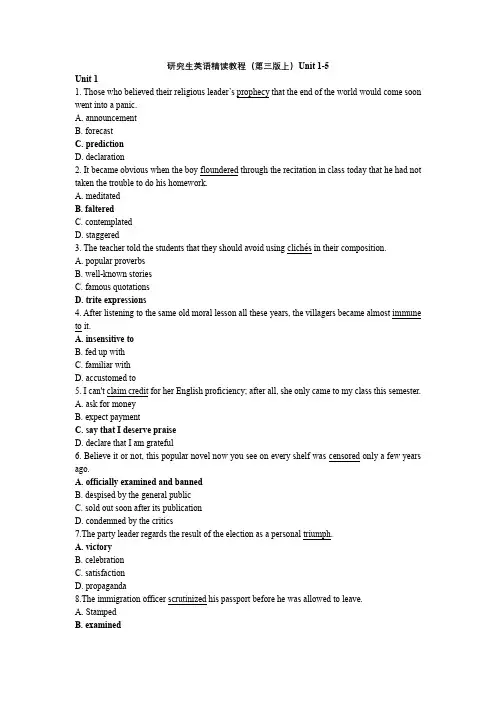
研究生英语精读教程(第三版上)Unit 1-5Unit 11. Those who believed their religious leader’s prophecy that the end of the world would come soon went into a panic.A. announcementB. forecastC. predictionD. declaration2. It became obvious when the boy floundered through the recitation in class today that he had not taken the trouble to do his homework.A. meditatedB. falteredC. contemplatedD. staggered3. The teacher told the students that they should avoid using clichés in their composition.A. popular proverbsB. well-known storiesC. famous quotationsD. trite expressions4. After listening to the same old moral lesson all these years, the villagers became almost immune to it.A. insensitive toB. fed up withC. familiar withD. accustomed to5. I can't claim credit for her English proficiency; after all, she only came to my class this semester.A. ask for moneyB. expect paymentC. say that I deserve praiseD. declare that I am grateful6. Believe it or not, this popular novel now you see on every shelf was censored only a few years ago.A. officially examined and bannedB. despised by the general publicC. sold out soon after its publicationD. condemned by the critics7.The party leader regards the result of the election as a personal triumph.A. victoryB. celebrationC. satisfactionD. propaganda8.The immigration officer scrutinized his passport before he was allowed to leave.A. StampedB. examinedC. returnedD. issued9. He suffered a long period of depression before his first suicide attempt.A. InoculationB. hypertensionC. ailmentsD. dejection10. He was never able to enjoy the metropolitan delights of cinemas and theatres.A. artisticB. modernC. urbanD. various11. He quickly _____ behind the building to avoid being hurt by the stones thrown in his direction.A. eludedB. evadedC. escapedD. dodged12. His dislike of the course may prove to be a _____ barrier he cannot overcome.A. BiologicalB. ideologicalC. spiritualD. psychological13. As the Cup Final was drawing closer, the injury of the best player was a _____ for the whole team.A. misdemeanourB. mistrustC. misfortuneD. mischief14. The best solution to the problem can only be found by a process of trial and _____.A. errorB. mistakeC. successD. experiment15. He thought that he might be able to avoid paying some of his taxes by taking advantage of the ______ in the law.A. circlesB. loopholesC. exceptionsD. misunderstanding16. When he lived in that remote place, radio was the only means he had to keep _____ of current events in the country.A. accountB. traceD. track17. ______ what is generally believed, the adjustment to this kind of work is quite easy.A. Contrary toB. Contrast withC. Controversial ofD. Contradictory to18. The flashing red light served as a ______ of danger ahead.A. predictorB. cautionC. precautionD. prevention19. Their confidence in him was greatly ______ by his prolonged hesitation before taking any action.A. appreciatedB. confirmedC. underminedD. cherished20. Your headache is likely to ______ if its real cause is not identified and proper treatment administered accordingly.A. cureB. recoverC. recurD. releaseUnit 21. After his father died, Bill took on the management of the factory.A. gotB. undertookC. organizedD. held2. Those students who have access to his esoteric discussions were impressed by the scope of his thinking.A. known by fewB. known to allC. very livelyD. quite popular3. The music of the radio distracted me from my reading.A. engrossedB. confusedC. refrainD. diverted4. Abraham Lincoln was quintessential American patriot.B. famousC. typicalD. revered5. Every now and then, the speaker interjected some witty remark.A. rejectedB. criticizedC. insertedD. jeered6. Why do you get angry over such trivial matters?A. of great worthB. of great benefitC. of little worthD. of little help7. The youngest boy was laughed at for his naive remarks.A. innocentB. wittyC. amusingD. foolish8. The lady rumpled her skirt by sitting on the seat while flying.A. disorderedB. disarrangedC. creasedD. crashed9. Thousands of people are needlessly slaughtered in road accidents in his country each year.A. woundedB. killedC. injuredD. crushed10. I bought this cloth cheap because there is a small defect in it.A. spotB. dotC. flawD. point11. Your job is not to make decisions but to _____ the decisions we make.A. completeB. accomplishC. implementD. affect12. Would you _____ him among th e world’s great statesmen?A. rankB. callC. nameD. hail13. Understanding is one of the most important _____ of a successful marriage.A. ingredientsB. standardsC. keysD. methods14. There are _____ of poison in the dead man’s blood.A. piecesB. tracesC. slicesD. lots15. He had been ill for months, and we were disturbed by his _____ complexion.A. fairB. sallowC. darkD. white16. A witness in court is _____ to tell the truth.A. temptedB. obligatedC. urgedD. praised17. A _____ swelling or tumour can usually be cured.A. malignantB. benignC. smallD. mild18. It is better to _____ on the side of mercy.A. errB. addC. workD. offer19. He has a very _____ address; he lives in the best part of town.A. wealthyB. comfortableC. prestigiousD. Accessible20. We all listened to the priest _____ the psalm.A. intoningB. utteringC. speakingD. deliveringUnit 31. High rate of unemployment and violence are deplored by many people.A. condemnedB. convincedC. declaredD. perpetuated2. They are planning to embark on a new business undertaking.A. go forB. go withC. go intoD. go on3. In the Middle Ages, many people in Europe suffered persecution for their religious beliefs.A. treatmentB. punishmentC. disillusionD. execution4. We couldn’t induce the old lady to travel by air.A. driveB. convinceC. forceD. suggest5. He went into a coma because of serious loss of blood.A. bad coughB. whitenessC. tremblingD. state of profound insensibility6. The ethics of his decision are doubtful.A. raceB. aestheticsC. moralsD. cause7. The patients tax the doctor's patience by asking him so many silly questions.A. pestB. are a strain onC. injureD. destroy8. They broke up the alliance.A. brought to an endB. dispersedC. stopped to enter intoD. changed for the worse9. The boys were summoned in turn to see the examiner.A. separatelyB. occasionallyC. allD. in succession10.They traveled all over the country, regardless of expense.A. unkind toB. paying no attention toC. forgettingD. concerned with11.The story was so funny that we were all in __________.A. excitementB. convulsionsC. emotionD. fixation12.Gluttony is just as much a __________ as drunkenness.A. viceB. vicinityC. viciousnessD. vicissitude13.Each room is decorated with a lamp ________ from the ceiling.A. droppedB. pulledC. suspendedD. fallen14.My first meeting with her often __________ to my memory.A. fellsB. recallsC. refreshesD. recurs15.He writes like a(n) __________: there are mistakes in every sentence.A. pupilB. illiterateC. teenagerD. school boy16.The goal is not yet ____________.A. to gainB. to sustainC. to restrainD. to attain17.It was reported that during the bombing, many people were killed or wounded by _____________.A. flowB. blastC. currentD. stream18.She learnt to swim at once - she seemed totally without _________ of the water.A. panicB. fearD. terribleness19. We raised a we must pay off it this year ______.A. creditB. good sumC. loanD. mortgage20. Some children complain that their parents ______ at them all day.A. blameB. scoldC. nagD. cryUnit 4B. great regretC. great despairD. great disappointment2. I have nothing but disdain for such a person.A. respectB. hatred3. The grass was interspersed with beds of flowers.A. scatteredB. spread4. I am sure disease must propagate in such unsanitary and crowded areas.C. promoteD. generate5. There was a meager attendance at the council meeting.B. enoughC. ampleD. haughty6. The end of 1921 found the capitalist offensive against the workers in full swing.A. negotiationB. punishmentB. refuseC. acceptD. take8. John was confined to bed for a week with his cold.C. tied toD. shut on9. We three were the sole survivors in the traffic accident.A. luckyB. fortunate10. I slept through her dull speech.C. fascinatingD. imaginative11. I have been in _________ with him about the matter.A. lettersB. dealings12. I could hear only __________ of their conversation.A. piecesD. portions13. The old lady ______ the sweet-smelling flowers into a garland.C. curvedD. twistedB. prudentC. shrewdD. rude15. Most bacteria grow best in a slightly acid ______.A. areaB. place16. Everyone knows that the firefly is a _____ insect.A. firingD. glowing17. Sports, and not learning, seem to ______ in that school. A. appearD. lead18. Each chess player will have five minutes to ______ his next move. A. makeB. have19. This time they really ______ better results.C. wishedD. wished toB. A wordC. WordsD. The wordUnit 51. His beautiful writing is akin to drawing.A. asB. from2. His knowledge on the subject seems to be on a par with my own. A. different fromC. related toD. in accordance with3. Tom and Mary were married a week after they met and soon found themselves at odds aboutB. on strikeC. in questionD. on purpose4. The inventor was vilified in yesterday's newspaper.C. praisedD. criticized5. The Mississippi flood of 1973 was a major catastrophe in which a great many lives were lost.C. changeD. threat6. She almost yielded to an unexpected impulse to dance in the street.C. good ideaD. fancy thought7. Mr. Green posed as a rich man though he owed more than he owned.A. workedB. looked8. They feared the plague and regarded it as a deadly scourge.B. IllnessC. troubleD. ailment9. Some people have a bias against foreigners.B. dislikeC. hatredD. favour10. Your stay abroad will give you ample opportunities to learn a new language.A. goodB. suitableB. surprisingC. fastD. unexpected12. Since the club owed $15 and had only $10 in the treasury, there was a ______ of $5.C. differenceD. surplus13. The oil lamp ______ softly on the table.A. glowedD. sounded14. It ______ with you to decide.A. talksD. indicates15. He ______ among the best heavyweight boxers of the past fifty years.A. projectsB. shows16. The constant turmoil in the office proved that he was an ______ administrator.C. experiencedD. active17. The mother tried to ______ her son’s interest in music by taking him to concerts when he was young.A. giveD. cause18. No matter how you read it, this sentence doesn’t make any __.A. meaningB. sound19. I tried to find my keys but I was ______ by my thick gloves.C. annoyedD. upsetB. interestedC. amusedD. disturbed。
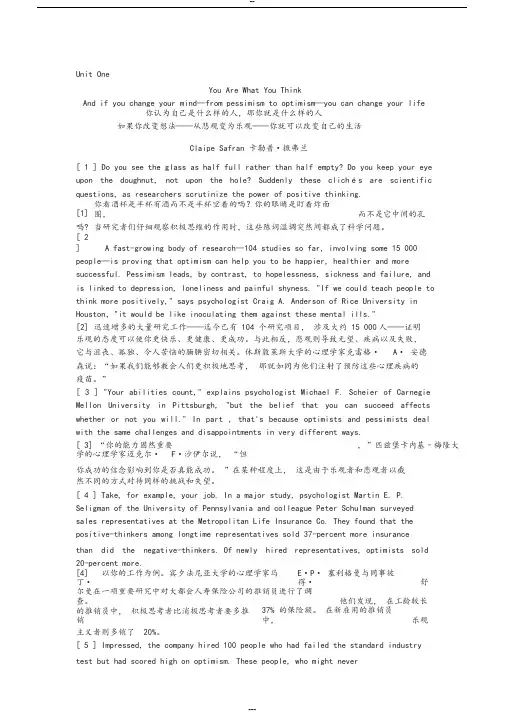
Unit OneYou Are What You ThinkAnd if you change your mind—from pessimism to optimism—you can change your life 你认为自己是什么样的人,那你就是什么样的人如果你改变想法——从悲观变为乐观——你就可以改变自己的生活Claipe Safran 卡勒普·撒弗兰[ 1 ] Do you see the glass as half full rather than half empty? Do you keep your eye upon the doughnut, not upon the hole? Suddenly these clichés are scientific questions, as researchers scrutinize the power of positive thinking.[1] 你看酒杯是半杯有酒而不是半杯空着的吗?你的眼睛是盯着炸面圈,而不是它中间的孔吗? 当研究者们仔细观察积极思维的作用时,这些陈词滥调突然间都成了科学问题。
[ 2] A fast-growing body of research—104 studies so far, involving some 15 000 people—is proving that optimism can help you to be happier, healthier and more successful. Pessimism leads, by contrast, to hopelessness, sickness and failure, andis linked to depression, loneliness and painful shyness. "If we could teach people to think more positively," says psychologist Craig A. Anderson of Rice University in Houston,"it would be like inoculating them against these mental ills."[2]迅速增多的大量研究工作——迄今已有 104 个研究项目,涉及大约 15 000人——证明乐观的态度可以使你更快乐、更健康、更成功。
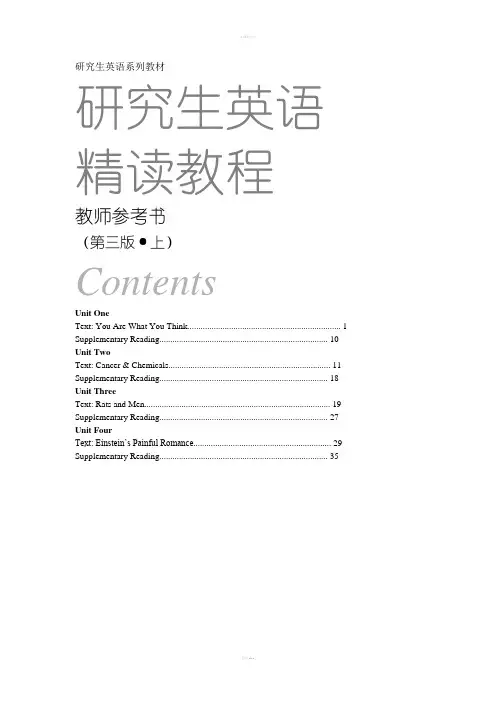
研究生英语系列教材研究生英语精读教程教师参考书(第三版·上)ContentsUnit OneText: You Are What You Think (1)Supplementary Reading (10)Unit TwoText: Cancer & Chemicals (11)Supplementary Reading (18)Unit ThreeText: Rats and Men (19)Supplementary Reading (27)Unit FourText: Einstein’s Painful Romance (29)Supplementary Reading (35)Unit FiveText: The End Is Not at Hand (37)Supplementary Reading (44)Unit SixText: Two Truths to Live By (47)Supplementary Reading (58)Mini-Test Ⅰ (59)Unit SevenText: Good Taste, Bad Taste (61)研究生英语精读教程教师参考书(第三版/上)Supplementary Reading (70)Unit EightText: I Have a Dream (73)Supplementary Reading (80)Unit NineText: This Was My Mother (81)Supplementary Reading (91)Unit TenText: Digital Revolution: How the Korean Group Becamea Global Champion (93)SupplementaryReading (100)Unit ElevenText: In Search of the Real Google (101)Supplementary Reading (118)Unit TwelveText: A Red Light for Scofflaws (119)Supplementary Reading (129)Mini-Test Ⅱ (131)►Text:You Are What You ThinkClaipe SafranLanguage Points1. Para. [2]: mental illsWhen used as a noun, “ill” means “anything causing harm, trouble,wrong,un happiness, etc., specifically: a) an evil or misfortune; b) a disease”.Its synonyms in this lesson: disease (Para.10), ailments(Para.11), illness (Para.11)Other synonyms: sickness, ailing, infirmity, indisposition, complaint, disorder, malady, distemper2. Para. [7]: When they failed on the first call or two ...When the first few people they phoned refused to donate blood ...3. Para. [8]: self-fulfilling prophecya prediction brought to fulfilment chiefly as an effect of having been expected or predicted4. Para. [9]: A sense of control ... is the litmus test for success.Whether one feels in control of the situation will determine if one succeedsin the end.5. Para. [10]: ... think they are better than the facts would justify ...overestimate themselves; regard themselves as better than they really are 6. Para. [13]: at one’s m other’s kneewhen one is a small child研究生英语精读教程教师参考书(第三版/上)Word Study1. donate v.donation n.donator n.①He donated all his savings to the village school.②They have donated to the Red Cross.③The van was donated to us by a local firm.④The new library has received a generous donation of 200 rare books from its favourite patron.⑤He made a donation of $1,000 to the children’s hospital.⑥The Famine Relief Fund has received 500 yuan in cash from an anonymous donator.2. recur v.recurring adj.recurrent adj.recurrence n.①He is more concerned about those problems which recur periodically.②If you divide 10 by 3, the result will be a recurring decimal.③Lack of confidence in himself will be a recurring problem for him in the future.④The patient complained of a recurrent headache.⑤He was aware of the possibility of recurrence of his illness.⑥His words of encouragement recurred to my mind whenever I was in low spirits.3. immune (to/against/from) adj.immunity n.immunize v.immunology n. study of resistance to infection①He seems to be immune to flattery.②We are immune from smallpox as the result of vaccination.③The child has received immunity to a variety of infections.Unit One④He was given immunity from taxation on the ground that he had been seriously injured.⑤Ambassadors enjoy diplomatic immunity in the countries in which they are stationed.⑥Everyone who is going abroad will need to be immunized againsttyphoid.⑦The government is going to spend more money on its immunizationprogram.⑧He has devoted all his life to immunology.4. caution n. & v.cautious adj.①You must exercise extreme caution when you cross this street.②The police gave him a caution for speeding.③The policeman cautioned the motorist about his speed.④They cautioned him about danger.⑤His teacher cautioned him that he might fail his exam.⑥If I had been less cautious, I might have made greater progress.⑦They are very cautious of/about giving offence.⑧He walked cautiously in this unknown territory.5. triumph n. & v.triumphant adj.①The conquest of outer space is one of the greatest triumphs of modernscience.②His life was a triumph over ill health.③Though he had beaten his opponent in the election, they could detect notriumph in his eye.④Grinning broadly, he held up the prize in triumph.⑤Justice triumphs in the end.⑥He triumphed over many difficulties.⑦Her triumphant smile told me how proud she was of her success.⑧Having succeeded at his first attempt, the boy looked at me triumphantly.研究生英语精读教程教师参考书(第三版/上)参考译文你认为自己是什么样的人,那你就是什么样的人如果你改变想法——从悲观变为乐观——你就可以改变自己的生活卡勒普·撒弗兰[1] 你看酒杯是半杯有酒而不是半杯空着的吗?你的眼睛是盯着炸面圈,而不是它中间的孔吗? 当研究者们仔细观察积极思维的作用时,这些陈词滥调突然间都成了科学问题。
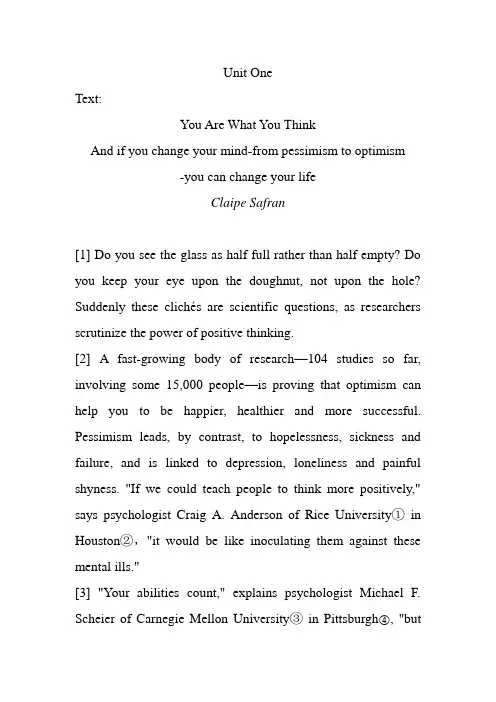
Unit OneText:You Are What You ThinkAnd if you change your mind-from pessimism to optimism-you can change your lifeClaipe Safran[1] Do you see the glass as half full rather than half empty? Do you keep your eye upon the doughnut, not upon the hole? Suddenly these clichés are scientific questions, as researchers scrutinize the power of positive thinking.[2] A fast-growing body of research—104 studies so far, involving some 15,000 people—is proving that optimism can help you to be happier, healthier and more successful. Pessimism leads, by contrast, to hopelessness, sickness and failure, and is linked to depression, loneliness and painful shyness. "If we could teach people to think more positively," says psychologist Craig A. Anderson of Rice University①in Houston②,"it would be like inoculating them against these mental ills."[3] "Your abilities count," explains psychologist Michael F. Scheier of Carnegie Mellon University③in Pittsburgh④, "butthe belief that you can succeed affects whether or not you will." In part , that's because optimists and pessimists deal with the same challenges and disappointments in very different ways. [4] Take, for example, your job. In a major study, psychologist Martin E. P. Seligman of the University of Pennsylvania⑤ and colleague Peter Schulman surveyed sales representatives at the Metropolitan Life Insurance Co. They found that the positive-thinkers among longtime representatives sold 37-percent more insurance than did the negative-thinkers. Of newly hired representatives, optimists sold 20-percent more. [5] Impressed, the company hired 100 people who had failed the standard industry test⑥ but had scored high on optimism. These people, who might never have been hired, sold 10 percent more insurance than did the average representative.[ 6 ] How did they do it? The secret to an optimist's success, according to Seligman, is in his "explanatory style". When things go wrong the pessimist tends to blame himself. "I'm no good at this, " he says, "I always fail." The optimist looks for loopholes. He blames the weather, the phone connection, even the other person. That customer was in a bad mood, he thinks. When things go right, the optimist takes credit while the pessimist sees success as a fluke.[ 7 ] Craig Anderson had a group of students phone strangers and ask them to donate blood to the Red Cross⑦. When they failed on the first call or two, pessimists said, "I can't do this." Optimists told themselves, "I need to try a different approach." [ 8 ] Negative or positive, it was a self-fulfilling prophecy. "If people feel hopeless, "says Anderson, "they don't bother to acquire the skills they need to succeed."[9] A sense of control, according to Anderson, is the litmus test⑧ for success. The optimist feels in control of his own life. If things are going badly, he acts quickly, looking for solutions, forming a new plan of action, and reaching out for advice. The pessimist feels like fate's plaything and moves slowly. He doesn't seek advice, since he assumes nothing can be done.[ 10 ] Optimists may think they are better than the facts would justify—and sometimes that's what keeps them alive. Dr. Sandra Levy of the Pittsburgh Cancer Institute studied women with advanced breast cancer. For the women who were generally optimistic, there was a longer disease-free interval, the best predictor of survival. In a pilot study of women in the early stages of breast cancer, Dr. Levy found the disease recurred sooner among the pessimists.[ 11 ] Optimism won't cure the incurable, but it may preventillness. In a long term study, researchers examined the health histories of a group of Harvard graduates, all of whom were in the top half of their class and in fine physical condition. Yet some were positive thinkers, and some negative. Twenty years later, there were more middle-age diseases—hypertension, diabetes, heart ailments —among the pessimists than the optimists.[ 12 ] Many studies suggest that the pessimist's feeling of helplessness undermines the body's natural defenses, the immune system. Dr. Christopher Peterson of the University of Michigan⑨ has found that the pessimist doesn't take good care of himself. Feeling passive and unable to dodge life's blows, he expects ill health and other misfortunes, no matter what he does. He munches on junk food⑩,avoids exercise, ignores the doctor, has another drink.[ 13 ] Most people are a mix of optimism and pessimism, but are inclined in one direction or the other. It is a pattern of thinking learned “at your mother‘s knee”,says Seligman. It grows out of thousands of cautions or encouragements, negative statements or positive ones. Too many “don’ts” and warnings of danger can make a child feel incompetent, fearful—and pessimistic.[ 14 ] As they grow, children experience small triumphs, such as learning to tie shoelaces. Parents can help turn these successes into a sense of control, and that breeds optimism. [ 15 ] Pessimism is a hard habit to break—but it can be done. In a series of landmark studies, Dr. Carol Dweck11of the University of Illinois12has been working with children in the early grades of school. As she helps floundering students to change the explanations for their failures—from "I must be dumb" to "I didn't study hard enough“—their academic performance improves.[ 16 ] Pittsburgh's Dr. Levy wondered if turning patients into optimists would lengthen their lives. In a pilot study, two groups of colon-cancer patients were given the same medical treatment, but some were also given psychological help to encourage optimism. Results showed that this worked. Now a major study is planned to determine whether this psychological change can alter the course of the disease.[ 17 ] So, if you're a pessimist, there's reason for optimism. You can change. Here's how, says Steve Hollon, a psychologist at Vanderbilt University13:[ 18 ] 1. Pay careful attention to your thoughts when bad things happen. Write down the first thing that comes to mind,unedited and uncensored[ 19 ] 2. Now try an experiment. Do something that's contrary to any negative reactions. Let's say something has gone wrong at work. Do you think, I hate my job, but I could never get a better one?Act as if that weren't so. Send out resumés. Go to interviews. Look into training and check job leads[ 20 ] 3. Keep track of what happens. Were your first thoughts right or wrong? "If your thoughts are holding you back, change them," says Hollon. "It's trial and error, no guarantees, but give yourself a chance."[ 21 ] Positive thinking leads to positive action, and reaction. What you expect from the world, the evidence suggests, is what you're likely to get..。
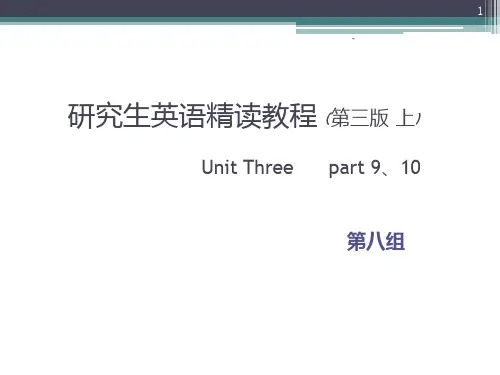
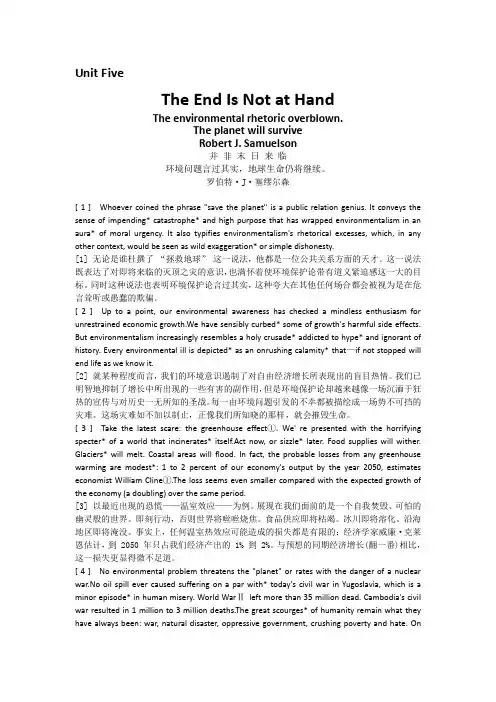
Unit FiveThe End Is Not at HandThe environmental rhetoric overblown.The planet will surviveRobert J. Samuelson并非末日来临环境问题言过其实,地球生命仍将继续。
罗伯特·J·塞缪尔森[ 1 ] Whoever coined the phrase "save the planet" is a public relation genius. It conveys the sense of impending* catastrophe* and high purpose that has wrapped environmentalism in an aura* of moral urgency. It also typifies environmentalism's rhetorical excesses, which, in any other context, would be seen as wild exaggeration* or simple dishonesty.[1] 无论是谁杜撰了“拯救地球”这一说法,他都是一位公共关系方面的天才。
这一说法既表达了对即将来临的灭顶之灾的意识,也满怀着使环境保护论带有道义紧迫感这一大的目标。
同时这种说法也表明环境保护论言过其实,这种夸大在其他任何场合都会被视为是在危言耸听或愚蠢的欺骗。
[ 2 ] Up to a point, our environmental awareness has checked a mindless enthusiasm for unrestrained economic growth.We have sensibly curbed* some of growth's harmful side effects. But environmentalism increasingly resembles a holy crusade* addicted to hype* and ignorant of history. Every environmental ill is depicted* as an onrushing calamity* that—if not stopped will end life as we know it.[2] 就某种程度而言,我们的环境意识遏制了对自由经济增长所表现出的盲目热情。
Unit SixTwo Truths to Live ByHold fast, and let go:understand this paradox*, and you standat thevery gate of wisdomAlexander M. Schindler[ 1 ] The art of living is to know when to hold fast and when to let go. For life is a paradox: it enjoins* us to cling to* its many gifts even while it ordains* their eventual relinquishment*The rabbis* of old put it this way: "A man comes to this world with his fist clenched*, but when he dies, his hand is open."[1] 生活的秘诀在于懂得何时抓紧,何时放松。
因为人生就是一对矛盾:它既令我们抓紧人生的多种赐与,同时它又要我们到头来把这些赐与放弃。
老一辈犹太学者是这样说的:“ 一个人握紧拳头来到这个世界,但他却是松开手掌离开这世界的。
”[ 2 ] Surely we ought to hold fast to life, for it is wondrous*, and full of a beauty that breaks through* every pore* of God's own earth. We know that this is so, but all too often we recognize this truth only in our backward glance when we remember what it was and then suddenly realize that it is no more.[2] 毫无疑问,我们应该牢牢抓住生命,因为它奇妙,它有一种在上帝创造的世界里无孔不入、无处不在的美。